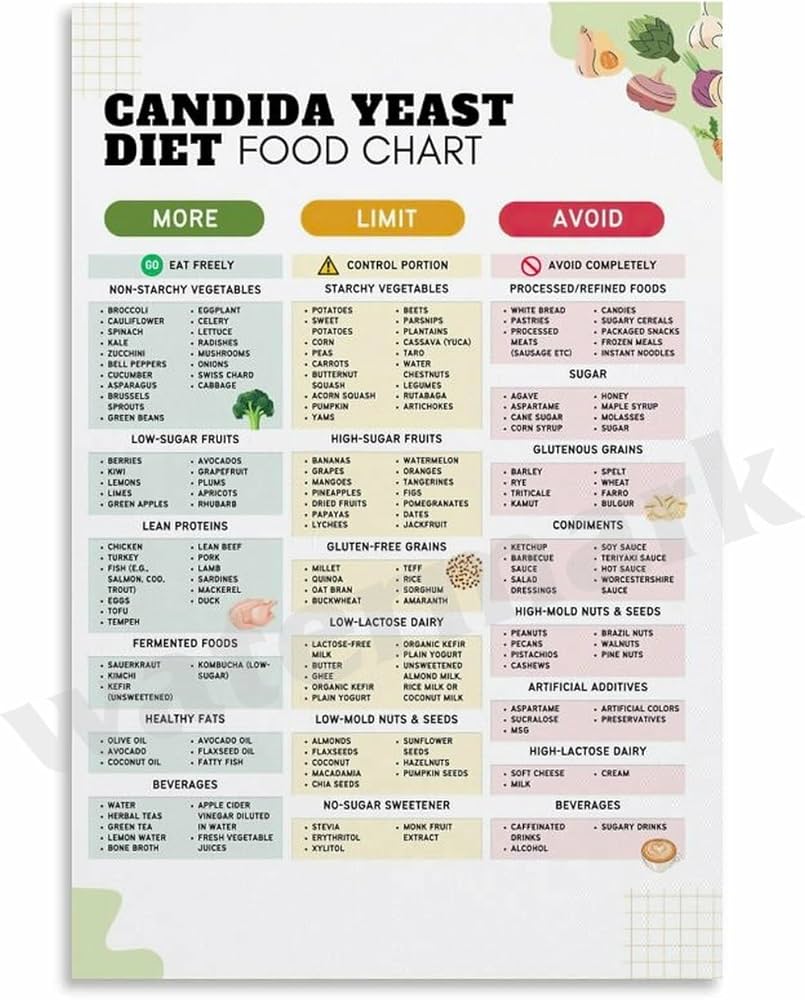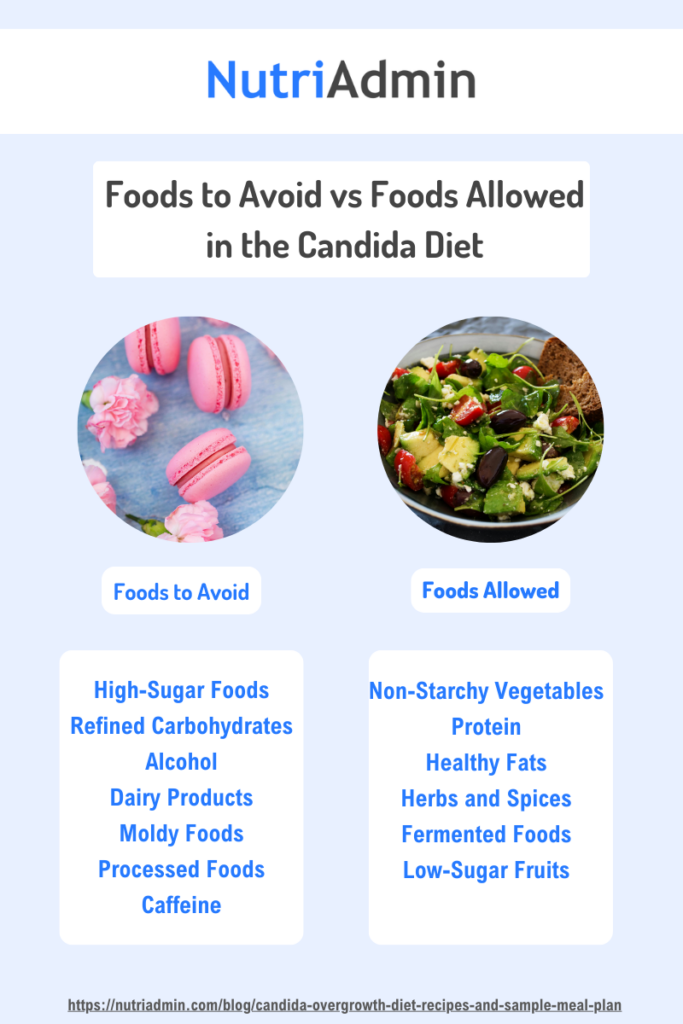Dealing with candida overgrowth can be tough. Many find relief through diet changes.
A Candida diet meal plan can help manage symptoms effectively. Candida is a yeast that lives in the body. Sometimes, it grows too much and causes problems. A candida diet aims to reduce this growth. It focuses on low-sugar, low-carb foods.
This helps starve the yeast and restore balance. Following a meal plan can make this diet easier. It provides structure and variety. You’ll find tasty, satisfying meals that support your health. Ready to get started? Let’s explore how a Candida diet meal plan can benefit you.
Introduction To Candida Diet
The Candida diet is designed to reduce yeast growth in the body. Many people suffer from Candida overgrowth, which can lead to various health issues. This diet focuses on foods that do not feed Candida, while promoting gut health.
What Is Candida?
Candida is a type of yeast found naturally in the body. It usually lives in small amounts in places like the mouth, gut, and skin. When the balance of good bacteria and yeast is disrupted, Candida can grow out of control.
- Causes of Candida overgrowth: Antibiotics, high sugar diets, stress.
- Symptoms: Fatigue, digestive issues, infections.
Importance Of Gut Health
Gut health is crucial for overall well-being. The gut contains trillions of bacteria that help digest food and protect against harmful bacteria.
- Balance: A balanced gut microbiome keeps Candida in check.
- Immune system: A healthy gut boosts the immune system.
- Digestion: Good gut health improves digestion and nutrient absorption.
| Foods to Eat | Foods to Avoid |
|---|---|
| Non-starchy vegetables | Sugary foods |
| Lean proteins | Refined grains |
| Healthy fats | Alcohol |
Maintaining a Candida diet can improve energy levels and reduce symptoms. Prioritize gut health to support your overall well-being.
Benefits Of The Candida Diet
The Candida Diet has gained attention for its potential health benefits. This diet focuses on reducing yeast overgrowth in the body. It involves cutting out sugar, gluten, and certain dairy products. Many people have reported positive changes in their health after starting the Candida Diet. Here, we will explore some of the key benefits.
Improved Digestion
A primary benefit of the Candida Diet is improved digestion. Eliminating sugar and refined carbs reduces bad bacteria in the gut. This helps maintain a healthy balance of gut flora. Many individuals notice less bloating and gas. Their bowel movements become more regular. This diet supports overall gut health.
Enhanced Energy Levels
People on the Candida Diet often report increased energy levels. Cutting out sugar and processed foods helps stabilize blood sugar. This leads to fewer energy crashes. The body uses nutrients more efficiently. Many feel more awake and alert throughout the day. They experience less fatigue and more stamina.
Foods To Avoid
When following a Candida diet meal plan, knowing which foods to avoid is crucial. Certain foods can cause Candida overgrowth. This can lead to various health issues. By avoiding these foods, you can help maintain a balanced gut. Below are some foods you should steer clear of during your Candida diet.
Sugary Foods
Sugar is a primary food source for Candida. It helps the yeast grow. Avoid foods high in sugar. This includes candies, cakes, and cookies. Even natural sugars like honey and maple syrup can feed Candida. Fruits high in sugar, such as bananas and grapes, should also be limited. Always read labels to check for hidden sugars in packaged foods.
Processed Foods
Processed foods often contain additives and preservatives. These can disrupt gut health. Avoid pre-packaged meals, snacks, and fast food. These often have high sugar and refined carb content. Canned foods and frozen dinners are usually high in unhealthy fats. Stick to whole, fresh foods to support your Candida diet.

Credit: www.everydayhealth.com
Foods To Include
Adopting a Candida diet meal plan can help manage and reduce symptoms of a Candida overgrowth. Including the right foods is essential for success. Below are key food groups to include in your meal plan.
Non-starchy Vegetables
Non-starchy vegetables are low in sugar and high in fiber. They help keep your gut healthy. Here are some excellent choices:
- Broccoli
- Spinach
- Kale
- Zucchini
- Cauliflower
These vegetables provide essential vitamins and minerals. They also help maintain a balanced diet. You can enjoy them steamed, roasted, or raw in salads.
Lean Proteins
Lean proteins are vital for muscle health and energy. They also help you feel full longer. Consider adding these lean protein sources:
- Chicken breast
- Turkey
- Fish (like salmon or cod)
- Eggs
- Tofu
Lean proteins are versatile. You can grill, bake, or sauté them. They pair well with non-starchy vegetables for a balanced meal.
Sample Meal Plan
The Candida Diet can seem restrictive, but it doesn’t have to be. A well-thought-out meal plan can make it easier to follow. This sample meal plan offers tasty options to keep you satisfied while staying on track.
Breakfast Ideas
Start your day with a healthy, Candida-friendly breakfast. You need energy for the day, and these options are both nutritious and delicious.
Scrambled Eggs with Spinach: Whisk eggs with fresh spinach. Cook in coconut oil for a protein-rich start.
Chia Seed Pudding: Mix chia seeds with unsweetened almond milk. Let it sit overnight. Top with berries.
Green Smoothie: Blend spinach, cucumber, and a green apple. Add unsweetened almond milk and enjoy.
Lunch And Dinner Options
Lunch and dinner should be filling and nutritious. These meal ideas will help keep your Candida under control.
Grilled Chicken Salad: Mix grilled chicken with leafy greens. Add avocado and a lemon-olive oil dressing.
Vegetable Stir-fry: Sauté broccoli, bell peppers, and zucchini. Use coconut oil and garlic for flavor.
Baked Salmon with Asparagus: Season salmon with herbs. Bake it with asparagus for a simple, healthy meal.
Quinoa and Veggie Bowl: Cook quinoa and mix with roasted vegetables. Drizzle with olive oil and a squeeze of lemon.
Turkey Lettuce Wraps: Use large lettuce leaves to wrap cooked ground turkey. Add diced tomatoes and a bit of avocado.
Snack Options
Sticking to a Candida diet can be challenging, especially when it comes to snacks. Fortunately, there are plenty of delicious and healthy options. Let’s explore some easy and tasty snack ideas that fit perfectly into your Candida diet meal plan.
Healthy Snacks
Choosing the right snacks can help you stay on track. Here are some healthy options:
- Vegetable sticks with hummus
- Almonds or walnuts
- Avocado slices sprinkled with sea salt
- Greek yogurt with no added sugar
These snacks are rich in protein and low in sugar. They keep you full and satisfied.
Quick And Easy Recipes
Sometimes, you need a quick snack that you can prepare in minutes. Try these simple recipes:
- Chia Seed Pudding
Ingredients:
- 2 tablespoons chia seeds
- 1/2 cup unsweetened almond milk
- 1/4 teaspoon vanilla extract
Mix all ingredients in a bowl. Let it sit for 15 minutes until it thickens. Enjoy!
- Baked Kale Chips
Ingredients:
- 1 bunch kale, washed and dried
- 1 tablespoon olive oil
- Salt to taste
Preheat your oven to 300°F (150°C). Tear kale into bite-sized pieces. Toss with olive oil and salt. Bake for 20 minutes or until crispy.
- Coconut Flour Pancakes
Ingredients:
- 2 eggs
- 2 tablespoons coconut flour
- 1/4 cup unsweetened almond milk
- 1/2 teaspoon baking powder
Mix all ingredients in a bowl. Pour small amounts into a hot, greased skillet. Cook until bubbles form, then flip and cook the other side.
These recipes are quick to make and perfect for any snack time.
Supplements And Probiotics
The Candida diet is not just about food choices. Supplements and probiotics play a crucial role. They support your gut health and boost your immune system. Let’s dive into the essential supplements and the role of probiotics in this diet.
Essential Supplements
Supplements are key in the Candida diet. They help your body fight Candida overgrowth. Here are some must-have supplements:
- Caprylic Acid: A fatty acid that kills Candida cells.
- Garlic Extract: Known for its antifungal properties.
- Oregano Oil: Contains carvacrol and thymol, which combat Candida.
- Grapefruit Seed Extract: Effective against many pathogens.
- Milk Thistle: Supports liver detoxification.
Taking these supplements can help restore balance in your gut.
Role Of Probiotics
Probiotics are good bacteria that help maintain a healthy gut. They are essential in the Candida diet. Here’s why:
- Restore Balance: They help balance the gut microbiome.
- Boost Immunity: They support your immune system.
- Reduce Inflammation: They can reduce gut inflammation.
Some effective probiotics include:
- Lactobacillus Acidophilus: Helps reduce Candida levels.
- Bifidobacterium Bifidum: Promotes gut health.
- Saccharomyces Boulardii: A yeast that fights Candida.
Consider adding a high-quality probiotic supplement to your diet.
Combining these supplements and probiotics can significantly improve your Candida diet results.

Credit: www.thecandidadiet.com
Tips For Success
Starting a Candida diet can feel overwhelming. But with the right tips, you can achieve success. Here are some practical strategies to help you stay on track and reach your health goals.
Meal Prep Strategies
Meal prepping is crucial for sticking to your Candida diet. Planning and preparing your meals in advance can save time and reduce stress. Here are some effective meal prep strategies:
- Plan your meals: Create a weekly meal plan. Include breakfast, lunch, dinner, and snacks.
- Shop smart: Make a grocery list based on your meal plan. Stick to the list to avoid buying unhealthy foods.
- Batch cook: Cook large portions of your meals. Store them in the fridge or freezer for easy access.
- Use containers: Invest in good quality containers. They help keep your food fresh and organized.
- Prep ingredients: Wash, chop, and store vegetables and fruits. This saves time during cooking.
Staying Consistent
Consistency is key to the success of your Candida diet. Here are some tips to help you stay consistent:
- Set realistic goals: Break down your goals into smaller, manageable steps.
- Track your progress: Keep a food journal. Record what you eat and how you feel.
- Stay positive: Focus on the benefits of the diet. Remember why you started.
- Find support: Join a community or find a buddy. Share your journey and motivate each other.
- Be flexible: Allow yourself some leeway. If you slip up, get back on track.
| Strategy | Benefit |
|---|---|
| Meal Prep | Saves time, reduces stress |
| Track Progress | Keeps you accountable |
| Find Support | Boosts motivation |
| Be Flexible | Helps you stay on track |
Following these tips can help you succeed on your Candida diet. Stay committed and focus on your health.

Credit: www.amazon.com
Frequently Asked Questions
What Is A Candida Diet Meal Plan?
A Candida diet meal plan focuses on reducing sugar and refined carbs. It aims to starve Candida yeast. It includes non-starchy vegetables, lean proteins, and healthy fats.
Can I Eat Fruit On A Candida Diet?
Most fruits are high in sugar and should be avoided. However, small portions of low-sugar fruits like berries can be included.
How Long Should I Follow The Candida Diet?
The duration depends on individual health conditions. Typically, it’s followed for a few weeks to a few months. Consult a healthcare provider for personalized advice.
What Foods Should I Avoid On A Candida Diet?
Avoid sugar, refined carbs, and processed foods. Stay away from alcohol, dairy, and starchy vegetables. Focus on whole, unprocessed foods.
Conclusion
Sticking to a Candida diet can improve your health. It helps balance gut bacteria and boosts immunity. The meal plan focuses on whole foods, low sugar, and fermented items. This approach reduces symptoms and promotes overall well-being. Start small, make gradual changes, and stay committed.
A healthy diet leads to a happier life. Remember, consistency is key. Your body will thank you!
